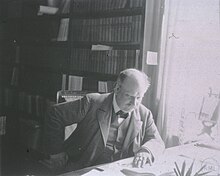Robert Tigerstedt
| Robert Adolph Armand Tigerstedt | |
|---|---|

Robert Tigerstedt at his library table, Helsinki, Finland.
|
|
| Born | 28 February 1853 Helsinki, Finland |
| Died | 12 February 1923 Helsinki, Finland |
| Nationality | Finnish |
| Alma mater | University of Helsinki |
| Known for | Discovery of renin |
Robert Adolph Armand Tigerstedt (28 February 1853 – 12 February 1923) was a Finnish-born medical scientist and physiologist who, with his student Per Bergman, discovered renin at the Karolinska Institute, in 1898. Renin is a component of the renin-angiotensin system which regulates blood pressure, salt and water homeostasis and is an important therapeutic target. Tigerstedt is also recognised as a seminal educator, author and social campaigner.
Tigerstedt was born in Helsinki on 28 February 1853. His parents were Karl Konstatin Tigerstedt and Evelina Theresia Tigerstedt (née Degerman). Karl Konstatin was a professor of history at the University of Helsinki.
Tigerstedt matriculated from Åbo Gymnasium in Turku in 1869, and then studied physical and natural sciences at the University of Helsinki, where he was taught by the notable chemist Carl Axel Arrhenius. He graduated from the University of Helsinki with a Master of Arts degree in 1873 and added a Bachelor of Science degree in 1876. Subsequently Tigerstedt studied medicine from 1876 to 1880. In 1878 he married his Ukrainian cousin, Ljuba Ludmila Martinau (1850–1935) and their first child, Maria (Ljubow Marie Nathalie Eveline (1879–1975)), was born while Tigerstedt was still a medical student. Two further children, Carl Christian Oskar Robert (1882–1930) and Margareta Wilhelmina Maria (1891–1980) followed. After completing his medical studies, in 1881 Tigerstedt submitted his doctorate entitled 'über Mechanische Nervenreizung' (On the mechanical stimulation of the nervous system) in Helsinki; however due to opposition from Konrad Hällstén, the professor of Physiology at Helsinki, he was unable to get a job in Helsinki and in 1881 he moved to to become a demonstrator in the newly founded department of physiology headed by Christian Lóven in the Karolinska Institute.
Tigerstedt remained at the Karolinska for the next 20 years, initially as Lóven's assistant and then as professor of physiology when Lóven retired in 1886. Tigerstedt undertook most of his major scientific work, including the discovery of renin during his two decades at the Karolinska Institute in Stockholm. His early research was mainly into nerve and muscle physiology, but after visiting Carl Ludwig's laboratory in 1881 and 1884 he started work on the physiology of the circulation for which he is now most famous. He also performed important studies in metabolism and nutrition, and with Klas Gustaf Anders Sondén designed the Sonden-Tigerstedt respiration chamber. Tigerstedt also wrote his Textbook of Human Physiology during this period. His friend Ivan Pavlov called it 'the greatest textbook of physiology ever written' and it exerted a considerable worldwide influence. Tigerstedt was fluent in several languages; edited four scientific journals concurrently; authored numerous articles in popular magazines; wrote an extensive range of biographical works on famous scientists; and made important contributions to modernizing the teaching of medical sciences in Stockholm and later in Helsinki.
...
Wikipedia
